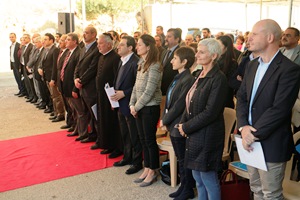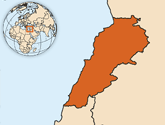 From right to left: UNICEF deputy representative, Dr Gabriele Riedner WHO acting representative, UNHCR representative, EU ambassador, Minister of Public HealthRACHAYA, 27 November 2015 – Today the Hospital of Rashaya received the visit of the Minister of Public Health Wael Bou Faour, Her Excellency the EU Ambassador Christina Lassen, UNHCR’s Representative in Lebanon Ms Mireille Girard, World Health Organization Representative in Lebanon, Dr. Gabriele Riedner, United Nations Children’s Fund Deputy Representative, Mr Luciano Calestini, and Rashaya Qaimaqam, Mr Nabil Al Masri, as they assisted in the handover ceremony of a large provision of medical equipment funded by the European Union.
From right to left: UNICEF deputy representative, Dr Gabriele Riedner WHO acting representative, UNHCR representative, EU ambassador, Minister of Public HealthRACHAYA, 27 November 2015 – Today the Hospital of Rashaya received the visit of the Minister of Public Health Wael Bou Faour, Her Excellency the EU Ambassador Christina Lassen, UNHCR’s Representative in Lebanon Ms Mireille Girard, World Health Organization Representative in Lebanon, Dr. Gabriele Riedner, United Nations Children’s Fund Deputy Representative, Mr Luciano Calestini, and Rashaya Qaimaqam, Mr Nabil Al Masri, as they assisted in the handover ceremony of a large provision of medical equipment funded by the European Union.
This equipment handover ceremony is to mark the support given by the European Union to the public health system of Lebanon. The equipment was provided through the project ‘Conflict Reduction through Improving Healthcare Services for the Vulnerable Population in Lebanon’ led by the Ministry of Public Health and implemented by UNHCR, in partnership with the World Health Organization, the United Nations Children’s Fund, International Relief and Development and International Alert.
Thanks to the generous support of the European Union, Rashaya El Wadi Governmental Hospital, as one of the 8 government hospitals supported through the project in Lebanon, has been provided with a wide range of medical equipment related to emergency obstetric and neo-natal care including cribs, fetal monitors, ultrasound machines, incubators and infant resuscitators; ICT and medical equipment to support the hospital’s primary health care centre, including laptops, flipcharts, vaccines, medications for chronic and acute disease, and a solar fridge to maintain the cold chain for vaccines; a water laboratory to test the quality of the local water supply with all the necessary equipment and a technician who was recruited and trained as part of the project.
As the project is nearing its end, a total of 221 public health care centres and 8 public hospitals have been supported providing the population with an increased access to healthcare and an increase quality of care; both achieved thanks to the extra human and physical resources made available. These include the supply of medicines, vaccines, services and equipment, training of staff and the integration of conflict sensitivity approach in the delivery of services. As a result, it is the overall public health system at the primary and secondary health care levels that has been strengthened to respond to the needs of the vulnerable population, Syrian refugees and poor Lebanese communities alike.
The project is worth EUR 20 million and is one of the largest institutional and community support projects in the framework of the Lebanon Crisis Response Plan.








